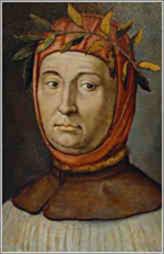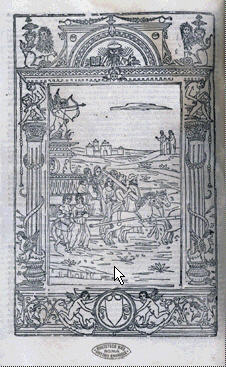Origin of
Tarot
Iconography Time Table Biographies Locations Forum News Communications Play FAQ Gallery
MUSEUM & SHOP Name Trionfi unknown future Reviews Webmasters Free Reading Links Final Words SITEMAP
| AUTORBIS.net | 2003 - updated April 2004 |
| Francesco Petrarca (1304-1374) (Petrarch) was an Italian scholar, poet and humanist. Often he's called the father of Renaissance and was regarded as the greatest scholar of his age. Petrarch's inquiring mind and love of classical authors urged him to travel, visiting men of learning and searching the libraries for classical manuscripts. Diplomatic missions, especially in the service of the Visconti in Milano, did lead him to the most important political leaders, he met Popes, the Emperor Charles IV. and the French king. In his late years (ca. from 1356 - 1374) he wrote the poem I Trionphi (Trionfi) in six chapters: Love, Chastity, Death, Fame, Time, Eternity. Petrarcas way to the poem and just this title "Trionfi" is observable in some actions, which happened before: In 1341 he became poetus laureatus - this and his love to a perhaps only imagined personal love-idol with the name Laura in a considerable manner dominated his literary work in the 40ies of 14th century, concentrated the theme and of course the laurel as attribute of the triumphator in the classical trionfi. With Cola de Rienzo a new political head appeared in Rome and awakened classical ideals. Petrarca followed Rienzo's career with great interest and took contact to him, taking sincerely part in Rienzo wild hopes. It seems, that already Cola de Rienzo tried to reestablish forms of triumphal processions in their earlier form, in his best times he himself adopted beside other titles the name Imperator Orbis and behaved in the style of an oriental sultan. His first reignment in 1447 ended after a half year, a second try killed him in 1354 and his corpse was drawn by horses through the streets of Rome, a very special form of counter-Trionfi. Petrarca started his poem probably short after Cola de Rienzos death, the theme of it is Laura and it is a great wide view of all life, but not Cola de Rienzo. From illustrations to this text developed a special theme of art, also called "Trionfi". Starting with pictures with the 6 chapter allegories on chariots, the artists developed from time to time more freedom, replacing Petrarcas allegories with others or Greek gods, finally also for natural persons. In a further development the chariot became unimportant, the artists learnt to express the idea of triumph with other stylistic measures. Parallel to this development in art the triumphal chariot became part of the more and more excessive festivities of 15th and 16th century, especially the typical Renaissance triumphal procession developed, in which the chariots played a natural role. From these both great general movements of art and social life jumped the idea of "Trionfi" into the decks of the playing-cards. However, as there is not much place on a playing card, the iconography changed from the usual many-persons-paintings to single figures, but the name was kept and these special cards also were called "Trionfi", a name, which to our knowledge first appeared around 1440, although a deck, which was called "Trionfi" by a speaker of the year 1449, Jacopo Antonio Marcello, already existed around the time of 1417 - 1424, produced for the hands of the Milanese duke Filippo Visconti. Out of a great pool of various experiments with Trionfi-cards on a long way finally that developed, what was called Tarocchi or Tarot later and what was detected with considerable excitement by Court de Gebelin around 1780 as a secret book from old Egyptia, a "fact". that he - according to his own words - understood within 15 minutes. It took around 200 years to get this idea under control again. Although nowadays there is more and more accepted, that the Tarocchi started in unclear form in the first half of 15th century in Italy, there still is much discussion about the details. One of these details is the (possible) influence of Petrarca on the early decks. Did give Petrarca birth to the whole Trionfi-idea or did he express with his poem only a generally trend of his time? Did the name jump from the poem to the deck, or, was it just taken cause Trionfi means "trumps" and in triumphal function they can make tricks at the card-game? Triumphal processions were already part of the life in old Rome, so Petrarca didn't invent anything, but Petrarca together with Boccaccio and some others were the explorers of the old and ancient knowledge and art, which was lost in the past 1000 years under the pressure of the wandering of nations in the early centuries. And the way, how they opened the door back in the old world created the reality of the new time, did spread ideas how to go on for many others. Petrarca opened the world with "Trionfi" and Boccaccio did his best to translate Homer. Some biographers had the opinion, that cultural development took a rest for nearly 50 years, when both died around 1374/75. Mankind used the free time to learn card playing, but was lazy enough to report us only few details about the first 50 years of doing so. And people tried the first starts of printing industry, eventually guided by the wish to produce playing cards in an easier way. Our site is more or less about playing cards, famous and less famous people appear here only to contribute to this theme. |
  |
| © copyright:
Trionfi.com Links at the site might lead to foreign sources. We're not responsible for the contents of these sites. If you're interested to communicate or to add informations to some of our articles or to publish articles to the theme of Tarot in 15th century, please send your mail to the webmaster |